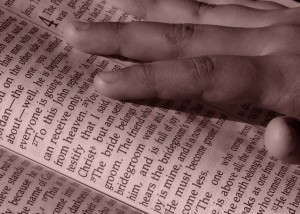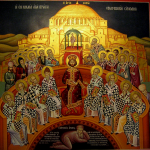I’ll be honest when I say that I don’t consider myself to be an apologist. I’m not like Trent Horn or Patrick Madrid or Scott Hahn or Taylor Marshall. I did better in my philosophy classes than in my theology classes in college. And yet, as a Catholic, I am called to defend my faith when the situation calls for it.
My Protestant friend, Holly, commented on my “Yes, I am a Christian AND?” post with a really long comment that I’m going to break down here in the hopes of starting a civil discussion and dialogue.
Holly’s comments will be written in blue.
Saying you believe in salvation coming through faith AND works is just not biblical.
Yes, yes it is.
“What good is it, my brothers and sisters, if you say you have faith but do not have works? Can faith save you? If a brother or sister is naked and lacks daily food, and one of you says to them, “Go in peace; keep warm and eat your fill,” and yet you do not supply their bodily needs, what is the good of that? So faith by itself, if it has no works, is dead.
But someone will say, “You have faith and I have works.” Show me your faith apart from your works, and I by my works will show you my faith. You believe that God is one; you do well. Even the demons believe—and shudder. Do you want to be shown, you senseless person, that faith apart from works is barren?” James 2:14-20
When I discussed with Holly about the Letter of James, she said that James was talking about justification, which to her, is different from salvation. According to the apologetics books I own, this is because Protestants in general believe in a difference between justification before God and justification before men and because they see salvation as a one time event.
According to the Catechism of the Catholic Church “justification includes the remission of sins, sanctification, and the renewal of the inner man” (CCC 2019). So justification does relate to salvation, as stated in this verse from Romans:
We know that our old self was crucified with him so that the body of sin might be destroyed, and we might no longer be enslaved to sin. For whoever has died is freed from sin. But if we have died with Christ, we believe that we will also live with him.- Romans 6:6-8
According to Catholic Answers: “What is significant about 6:7 is that when it says the one who has died has been freed from sin, the word for “freed” is actually the Greek word for “justified.” What it literally said was “he who has died has been justified from sin,” yet the context is so obviously sanctificational that all standard English translations of the Bible rendered “justified from sin” as “freed from sin.”
Ephesians 2:8-9 says, “For by grace you have been saved through faith; and that not of yourselves, it is the gift of God; not as a result of works, so that no one may boast.” Now of course if we are truly saved, we will want to please God, and our life will show obedience to His Word and commands. But it is ONLY through His grace that we are saved, and if we say we must do works to receive our salvation, that goes against these Words and ignores what He did on the cross for us. Works are a result of being In Him, but they have nothing to do with our salvation.
I often hear Protestants talking about having a personal relationship with Christ. Since Christ is fully human (as well as being fully divine), let’s approach justification and salvation from the perspective of a relationship.
When we have a relationship with a person, it’s not enough to just say that we love them. If there’s anything I learned from the comedy of errors that I call my love life, it’s that actions speak louder than words.
Ephesians 2:10, the verse that comes right after those two sentences says “For we are what he has made us, created in Christ Jesus for good works, which God prepared beforehand to be our way of life.” (Emphasis mine.)
The second chapter of the Letter from James gives examples of people in the Bible whose faith was shown through action:
Was not our ancestor Abraham justified by works when he offered his son Isaac on the altar? You see that faith was active along with his works, and faith was brought to completion by the works. Thus the scripture was fulfilled that says, “Abraham believed God, and it was reckoned to him as righteousness,” and he was called the friend of God. You see that a person is justified by works and not by faith alone. Likewise, was not Rahab the prostitute also justified by works when she welcomed the messengers and sent them out by another road? For just as the body without the spirit is dead, so faith without works is also dead. – James 2:21-26
Paul also shows how salvation is a process in his letter to the Philippians:
Therefore, my beloved, just as you have always obeyed me, not only in my presence, but much more now in my absence, work out your own salvation with fear and trembling; for it is God who is at work in you, enabling you both to will and to work for his good pleasure. – Philippians 2:12-13
Like any good relationship, a real loving and functional relationship with Christ starts with faith and grace, but needs works in order to thrive and grow. Christ dying on the Cross and rising from the dead was just the beginning of salvation, just like how a wedding is only the start of the life a married couple will share together. And that’s why faith and works belong with each other. Like a marriage, our relationship with Christ depends on believing in Him and sharing His love to the world through works and actions. Catholics don’t believe that doing a lot of good deeds will make up for any bad things, but that our faith inspires us and motivates us to go out into the world and testify to our faith through doing good.
But really, this passage from the Gospel of Matthew is, I think the strongest proof of how works contribute to salvation:
“When the Son of Man comes in his glory, and all the angels with him, then he will sit on the throne of his glory. All the nations will be gathered before him, and he will separate people one from another as a shepherd separates the sheep from the goats, and he will put the sheep at his right hand and the goats at the left. Then the king will say to those at his right hand, ‘Come, you that are blessed by my Father, inherit the kingdom prepared for you from the foundation of the world; for I was hungry and you gave me food, I was thirsty and you gave me something to drink, I was a stranger and you welcomed me, I was naked and you gave me clothing, I was sick and you took care of me, I was in prison and you visited me.’ Then the righteous will answer him, ‘Lord, when was it that we saw you hungry and gave you food, or thirsty and gave you something to drink? And when was it that we saw you a stranger and welcomed you, or naked and gave you clothing? And when was it that we saw you sick or in prison and visited you?’ And the king will answer them, ‘Truly I tell you, just as you did it to one of the least of these who are members of my family, you did it to me.’ Then he will say to those at his left hand, ‘You that are accursed, depart from me into the eternal fire prepared for the devil and his angels; for I was hungry and you gave me no food, I was thirsty and you gave me nothing to drink, I was a stranger and you did not welcome me, naked and you did not give me clothing, sick and in prison and you did not visit me.’ Then they also will answer, ‘Lord, when was it that we saw you hungry or thirsty or a stranger or naked or sick or in prison, and did not take care of you?’ Then he will answer them, ‘Truly I tell you, just as you did not do it to one of the least of these, you did not do it to me.’ And these will go away into eternal punishment, but the righteous into eternal life.” – Matthew 25: 31-46
Addendum 9/23/15 1:10PM
I shared this post with Catholic Answers staff apologist Michelle Arnold who said: “We can agree with your friend that grace comes first. Grace makes it possible for us to have faith and to do good works. Without God acting first, even so far as to give us the actual grace to desire supernatural faith, we can’t do anything. Where your friend goes off the track is in concluding that works are unnecessary. Faith and works are our responses to grace: faith, interiorly, and works, exteriorly. Both are necessary, but both flow from grace received from God.”

















